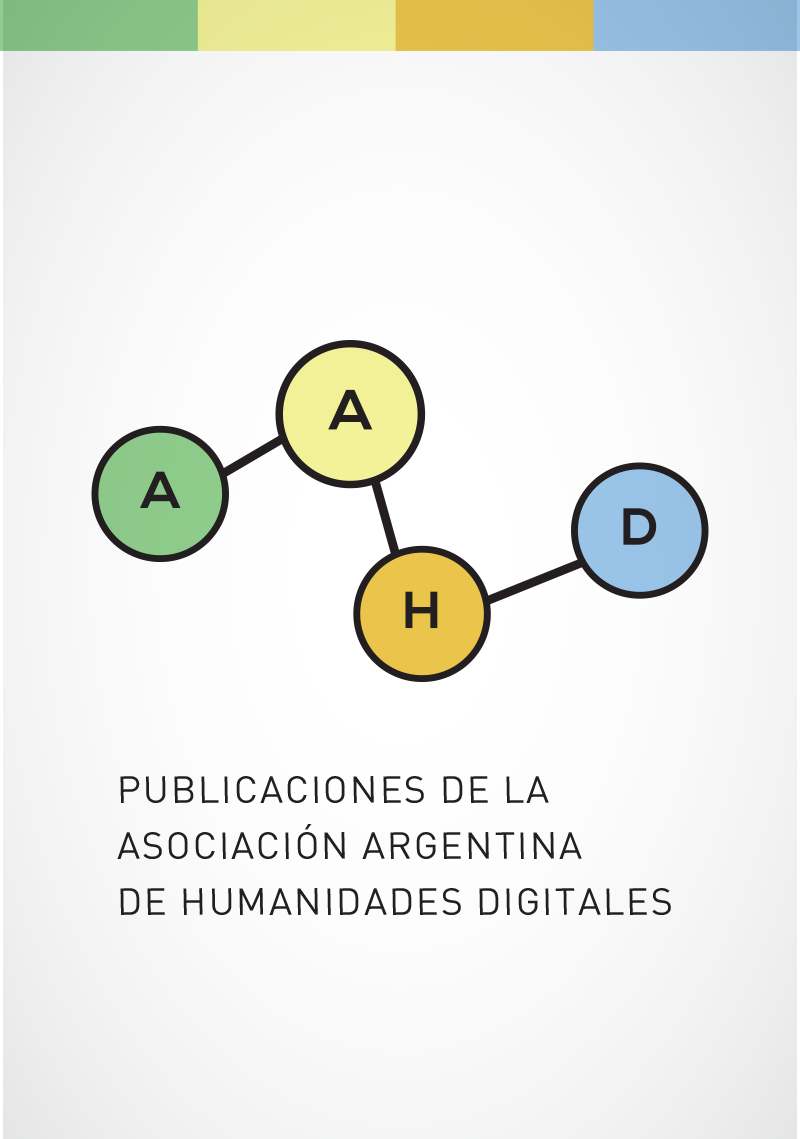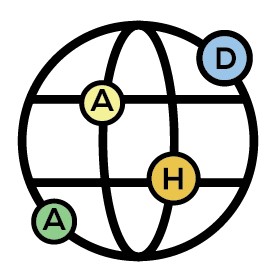Digital Publishing with Minimal Computing (UMD-USAL, 2020)
Our Experience as Students
DOI:
https://doi.org/10.24215/27187470e022Keywords:
Digital Publishing, Minimal Computing, XMLTEI, GitLab, JekyllAbstract
Our work shares the experience of the course Digital Publishing with Minimal Computing/ Ediciones digitales con minimal computing, which was taught in virtual modality by Raffaele Viglianti (University of Maryland) and Gimena del Rio Riande, Romina De León and Nidia Hernández (Consejo Nacional de Investigaciones Científicas y Técnicas) between September and December 2020. We are interested in ing the opportunities and difficulties that we perceived when working with the XML markup language and the standard developed by the Text Encoding Initiative to address our first digital edition of a text ‒especially, “A description of Buenos Aires”, contained in An account of a voyage up the River de la Plata, from Acarete du Biscay (17th century)‒ published in both English (1698) and Spanish (1867) and, at the same time, with open technologies such as GitLab and Jekyll to achieve its publication on a website. Undoubtedly, the collaborative methodology encourages us to undertake other tasks and projects of Digital Humanities.
Downloads
References
Allés Torrent, S. (2019). Introducción a la Text Encoding Initiative. TTHUB. Text Technologies Hub: Recursos sobre tecnologías del texto y edición digital. https://tthub.io/aprende/introduccion-a-tei/
Altuna, E. (2004). Acarette du Biscay: Los vulnerables límites del imperio. Revista de crítica literaria latinoamericana, 60, 189-207. https://as.tufts.edu/romancestudies/rcll/pdfs/60/11-ALTUNA.pdf
Bhaskar, M. (2014). La máquina de contenido. Buenos Aires: Fondo de Cultura Económica.
Chacon, S. y Straub, B. (2014). Pro Git (Versión en español, 2.ª ed.). Apress. https://git-scm.com/book/es/v2
del Rio Riande, G. (11 de febrero de 2020). La mirada crítica de las humanidades digitales. The Conversation. https://theconversation.com/la-mirada-critica-de-las-humanidades-digitales-131488
del Rio Riande, G., Cantamutto, L. y Striker, G. (eds.) (2016). Las Humanidades Digitales desde Argentina. Tecnologías, Culturas, Saberes. Actas de las I Jornadas de Humanidades Digitales de la Asociación Argentina de Humanidades Digitales. Editorial de la Facultad de Filosofía y Letras de la Universidad de Buenos Aires, Argentina. https://www.aacademica.org/gimena.delrio.riande/68
Du Biscay, A. (2001). Relación de un viaje al Río de la Plata y de allí por tierra al Perú con observaciones sobre los habitantes, sean indios o españoles, las ciudades, el comercio, la fertilidad y las riquezas de esta parte de América. Biblioteca Virtual Miguel de Cervantes. http://www.cervantesvirtual.com/obra/relacion-de-un-viaje-al-rio-de-la-plata-y-de-alli-por-tierra-al-peru-con-observaciones-sobre-los-habitantes-sean-indios-o-espanoles-las-ciudades-el-comercio-la-fertilidad-y-las-riquezas-de-esta-parte-de-america--0/
GitLab (29 de julio de 2020). En Wikipedia. https://es.wikipedia.org/w/index.php?title=GitLab&oldid=128099614
Haché, A. (ed.). (2014). Soberanía tecnológica [Archivo PDF]. Ritimo. https://www.ritimo.org/IMG/pdf/dossier-st1-es.pdf
Minimal Computing (19 de marzo de 2021). About Minimal Computing. http://go-dh.github.io/mincomp/about/
Moretti, F. (2015). Lectura distante. Buenos Aires: Fondo de Cultura Económica.
Padilla, M. (2017). Soberanía tecnológica. ¿De qué estamos hablando? En A. Haché (ed.), Soberanía tecnológica, 2. https://www.ritimo.org/IMG/pdf/sobtech2-es-with-covers-web-150dpi-2018-01-13-v2.pdf
Pop, L. (2017). A Low Te(a)ch Approach to Digital Humanities. Studia UBB Digitalia, 62(LXII), 83-88. http://studia.ubbcluj.ro/download/pdf/1104.pdf
Priani Saisó, E. y Guzmán Olmos, A. M. (2014). TEI como una nueva práctica de lectura. Humanidades Digitales: desafíos, logros y perspectivas de futuro. Janus, Anexo 1, 373-382. http://hdl.handle.net/2183/13567
Sayers, J. (2016). Minimal Definitions. Minimal Computing, 3. http://go-dh.github.io/mincomp/thoughts/2016/10/ 03/tldr/
Slack (software) (27 de mayo de 2021). En Wikipedia. https://es.wikipedia.org/w/index.php?title=Slack_(software)&oldid=135859194
Terras, M., Vanhoutte, E. y Van den Branden, R. [TEI by Example] (s.f.). Module 0: Introduction to Text Encoding and the TEI. https://teibyexample.org/tutorials/TBED00v00.htm#summary [traducción propia]
Visconti, A. (2016/2021). Creación de sitios estáticos con Jekyll y GitHub Pages. The Programming Historian en español. Traducido por: Gimena del Rio Riande, Raffaele Viglianti, Gabriel Calarco, Nidia Hernández y Romina De Léon https://doi.org/10.46430/phes0050
Downloads
Published
How to Cite
Issue
Section
License
Copyright (c) 2021 Gabriel Alejandro Calarco, Pamela Gionco , Rocío Méndez, David Merino Recalde, Gabriela Striker, Cristian Suárez-Giraldo

This work is licensed under a Creative Commons Attribution-ShareAlike 4.0 International License.
Los autores que publican en esta revista están de acuerdo con los siguientes términos:
- Los artículos publicados en la revista se encuentran disponibles en acceso abierto.
- Los autores conservan los derechos de autor y garantizan a la revista el derecho de ser la primera publicación del trabajo al igual que licenciarlo bajo una Licencia Creative Commons Atribución-CompartirIgual 4.0 Internacional (CC BY-SA 4.0), que permite copiar y redistribuir el material en cualquier medio o formato y remezclar, transformar y construir a partir del material bajo los siguientes términos: debe dar crédito de manera adecuada, brindar un enlace a la licencia, e indicar si se han realizado cambios.
- Los autores pueden depositar el trabajo en un repositorio de preprints, postprints, establecer por separado acuerdos adicionales para la distribución no exclusiva de la versión de la obra publicada en la revista (por ejemplo, situarlo en un repositorio institucional o publicarlo en un libro), con un reconocimiento de su publicación inicial en esta revista.
- Se alienta a los/as autores/as a realizar el depósito de datos en SEDICI, o en cualquier otro repositorio de datos de investigación (como Zenodo, donde la AAHD ha creado un repositorio temático para HUMANIDADES DIGITALES), de manera previa a realizar el envío de la contribución a la revista. De este modo, al remitir el artículo solo se deberá indicar la URL donde se encuentran los datos de investigación.


























